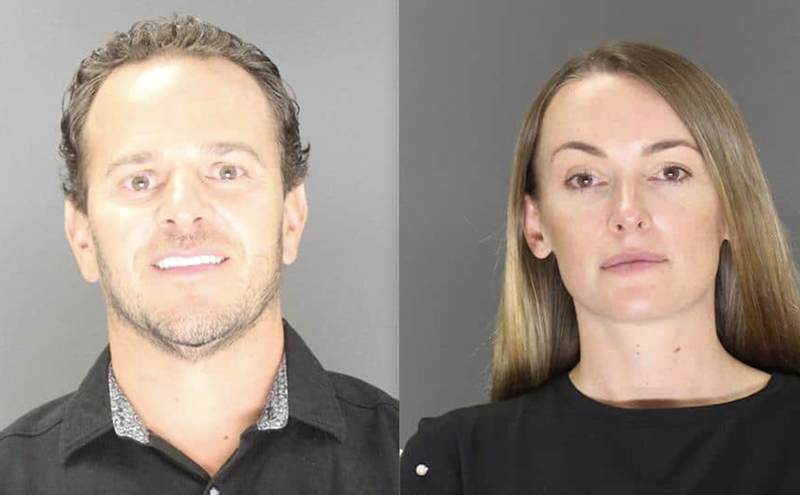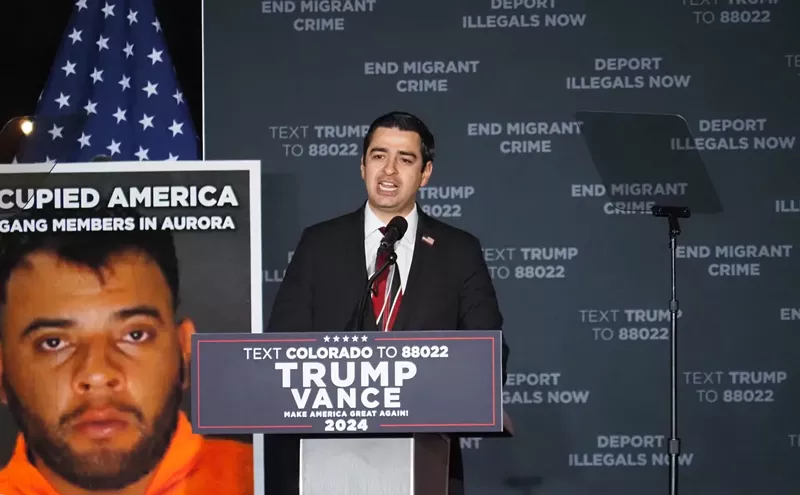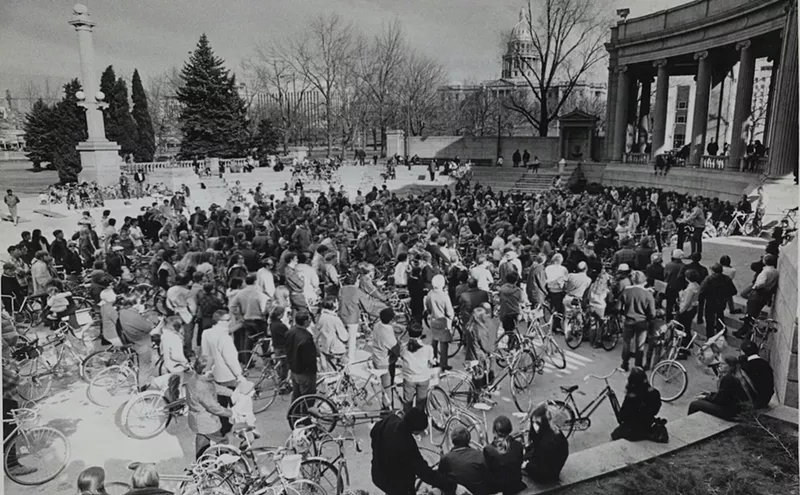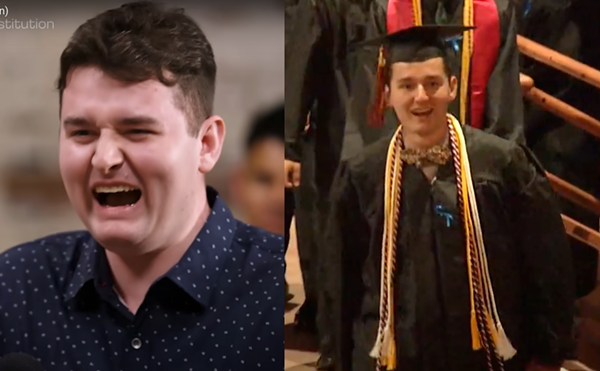Over the past decade, three men -- Gil Spencer, Dennis Britton and Glenn Guzzo -- have served as the Post's editor, and many journalists believe a fourth person, Neil Westergaard, deserves this designation as well. (In an exchange of letters in Westword a few months ago, Spencer and Post owner Dean Singleton disagreed over whether Westergaard ever filled the role officially, even though he led the paper for well over a year.) If the least secure high-profile job in the city remains "head coach of the Denver Nuggets," "Denver Post editor" isn't far behind.
But 47-year-old Greg Moore doesn't seem gun shy in the slightest. The Post's editor since June 10, he's forthright, commanding, direct, and not given to expressions of doubt. His self-assurance recalls Robert Duvall's character in Apocalypse Now, who strolls through battles without concern because he's certain that no bomb or bullet has his name on it.
Moore's resumé testifies to his resilience. He began his reporting career at the Dayton Journal Herald in 1976, jumped to the Plain Dealer in Cleveland, his hometown, four years later, and moved to the Boston Globe in 1986. In his sixteen years at the Globe, Moore ascended from assistant metro editor to managing editor, earning praise along the way from colleagues and rivals alike for his contributions to numerous blockbusters, including recent stories of sexual abuse among the Catholic clergy.
The low point of Moore's Globe tenure took place in 1998, when writer Patricia Smith, whom he edited, resigned after having admitted fabricating items in her column. There's no telling if this connection slowed Moore's upward trajectory at the paper. But when Globe editor Matt Storin stepped down in mid-2001, Moore, along with several other internal candidates, was bypassed for the top slot in favor of Miami Herald executive editor Marty Baron. Less than a year later, Moore accepted Singleton's offer to take over the Denver Post.
Support from the mercurial Singleton is critical for Moore -- but keeping the main man happy is hardly his only challenge. Despite being first among equals in the joint operating agreement that mated its business operation to that of its crosstown foe, the Rocky Mountain News, in 2001, the Post remains a house divided -- a workplace marked more by its backbiting and rumor-mongering than by high morale and professional satisfaction. Quality remains an issue, as well. The paper has an abundance of resources thanks to Singleton, who's often said he wants the Post to be one of America's great newspapers. Thus far, though, its aspirations have only intermittently translated to achievements. David Migoya's recent series exposing the dirty secrets of the meat industry demonstrates the heights to which the Post can rise. But most nights, no one at the New York Times is losing any sleep over what the Denver Post is doing.
The following exchanges took place on July 22 in Moore's office, where personal touches consist primarily of two framed posters: One near his desk commemorates the anniversary of the landmark Supreme Court decision Brown v. Board of Education, which led to school desegregation; the other is labeled "Field to Factory: Afro-American Immigration, 1915-1940."
Obviously, Moore, the first African-American editor of the Post, doesn't downplay his heritage. But neither does he overemphasize it in discussing his plans. Instead, he talks about instilling the paper with a new sense of energy, style, intelligence and urbanity -- and if a shakeup accomplishes these goals, so be it. His words can be blunt, as he demonstrates while critiquing specific parts of the Post; likewise, the messages he sends to beat reporters and columnists aren't subtle. No wonder many of his new charges are somewhat panicky about the future.
When Moore's robust sense of humor and surplus of charisma are on display, such fears seem unfounded. But he can also be snappish -- a side that emerges after he's told about some comments made by News editor John Temple in a conversation chronicled here last week ("Inside the Temple," August 1). The two editors have been friendly since spending time together at a journalism conference earlier this year, but Moore's manner makes it clear that camaraderie won't stop him from trying to best the Rocky day in and day out. For Denver readers, his attitude is a very good sign.
Westword: What were the events during your career that were the most formative for you?
Greg Moore: The first one was in Dayton, Ohio, when I was only 24 years old and I became a City Hall reporter. I was getting my butt regularly kicked by this veteran at the Dayton Daily News, the evening paper. He knew where all the bodies were buried, he knew all the reports that were about to come to fruition. He was just killing me. I was doing my own thing, and I'd had a number of page-one stories, but I was really despondent. So my city editor took me out, and I was like, "I'm really sorry. I don't understand what's happening. I'm working as hard as I can on my own stories." And he said, "I don't have any complaint with you. As long as you're doing stories that you think are important and we think are worth page one, well, that's the nature of competition. They're going to have some things we don't have. But if this is happening six months from now, we're going to have a serious talk."
What did you take from that?
That you have to give people time to develop beats and expertise. But it's fair to expect them to be setting their own agenda -- to not sit around waiting and wondering what the competition does. And in time, hopefully, they'll be able to get the stories that matter the most. That's one lesson I learned -- and another one came when I was 28 and my city editor -- or maybe it was the managing editor -- tapped me on the shoulder and told me he wanted me to be an editor. And I really didn't want to be an editor.
Why not?
I was covering politics, and I was enjoying being responsible for myself. I'd spent a couple of years covering this beat, and I'd just gotten to the point where I didn't have to be there every day and information came to me. I was mastering the beat, and I wanted to enjoy the fruits of my labor. But the lesson I learned on that is, if you can't see potential in yourself, sometimes other people can -- and you've got to be willing to go with the flow. I did, and I've been an editor ever since.
What about lessons from the Globe?
A lot of great lessons -- and one of the biggest is that the best newspapers thrive on ideas and concepts. They cover the events that happen very well, creatively, but when things are slow, they're able to look at the ideas and concepts that help drive the news. So I learned to look at stories, read them all the way down and then turn the prism a little bit and find some new angles that provide fresh perspective. But having had some tough moments at the Globe, I also learned that when those tough moments present themselves, don't put them off. Do what needs to be done. Because tough problems only get tougher when you don't deal with them.
There are a lot of tough problems at the Post, and many people expected you to come in and make instantaneous changes. But for the most part, you've moved more slowly. Are you trying to apply the same patience to the Post that your editor in Dayton had with you?
I am. I don't believe quick fixes are lasting fixes. The easiest thing would be for me to come in and say, "Everybody here is terrible, and I'm just going to bring in all new people." But to lay waste to the place and chop off people's heads and make lifetime decisions about their careers in six weeks is stupid. I want to build a foundation that's going to last, and you do that by taking your time, putting your system in place, giving people a chance to adjust -- and if they don't, they don't. I think people really rise to the expectations that are put on them.
Is that the message you've been giving to people in various departments right now? That at a certain point, more will be expected of them?
I need our people on beats doing a very aggressive job, and I want a higher page-one quotient than they've been accustomed to. If they fall back to metro front or page two of metro, great. But aiming for the inside just to feed the beast is not going to work. And people who want their beats and enjoy their beats should be performing at a very high level. I'm in the process of talking to all the beat reporters, trying to assess their level of excitement and satisfaction on the beats they've covered. Most of the people I've talked to have said they really love their beats and they want to stay on them. And I say, "Well, if you like them, that's great. But you really, really, really need to be on page one." Everybody understands what I want -- and they know they'll be measured from this point forward.
Do you have a set expiration date regarding beats, where if people have been on a beat for X number of years, they've been there too long?
You want to create the expectation that a beat is an assignment, and like any assignment, it's a finite thing. I don't want someone sitting on a beat for a decade or two decades; that really retards their development, especially if they're younger people. Having some expertise is fine, but five or six years on a beat is a lot. Even if they're comfortable doing that, it's not really in their best interest to leave them there indefinitely, so I don't plan to do that -- and I apply that to myself.
That seems to tie into your second anecdote, about initially wanting to enjoy the fruits of your labors instead of taking on something new. Can an excess of comfort be a detriment to a beat reporter?
When you get comfortable, you lose your sense of urgency. The first year covering a beat, you're just trying to find the bathroom -- trying to figure out the mechanics of the place. The second year, you're really sharpening your knowledge, and the third year, you know your beat well enough that some things are beginning to come to you -- and the fourth year, you own that turf and are really dominating it if you've been working hard. But after that, you start getting bored and needing something new. And it's up to us as managers to maintain that level of enthusiasm and keep reporters on an upward trajectory, learning new things. At the Globe, I found out there were people who'd been covering beats for a decade who'd never been asked, "Is there something else you'd like to do?" -- and when they were asked, they jumped at the chance. So I plan to ask that question.
As you know, Dean Singleton is a big admirer of the Globe, and he's said he set out to hire you because he felt you'd made the paper what it was. Did you?
No paper is the result of the efforts of one person, so I don't ever want that said. But I'm a product of the Globe, and I understand some of the things that made it distinctive. First and foremost, what makes the Globe the Globe is talent, and you've got to go out and hire it, develop it and nurture it -- and that's what we've got to do here. So just my hiring as an individual isn't going to make the Denver Post more than what it is now. You have to have people who are really dedicated to the news business. Not the opinion business, not the personality business, but the news business. I'm pleased that Dean likes the Globe, because I don't think I would probably be here unless he did. But I'd like him to talk about the Globe a little less -- stop talking about that and give us a chance to do what we need to do here.
The story for which the Globe has gotten the most attention lately has been the Catholic Church scandal. How involved were you in that coverage?
Involved, very involved. This is the whole truth; this is not a lie; this is what happened. There'd been some ongoing coverage about one priest who'd been accused of abusing kids: Father Geoghan. One of our columnists had written a piece last July questioning whether we would ever know the truth if impounded documents weren't released and opened to the public. I saw that when I came back from vacation, and I went to our investigative editor and said, "This might be a target of opportunity for us if we could find out whether or not the problem in the Catholic Church goes beyond this one priest. Do you think you guys might be able to uncover some stuff?" And he said, "Yeah, that might be something we should try to do." And then I talked to Marty [Baron] and said, "I want you to know, since this has been a sensitive area in the past, that we're taking a look at the Geoghan case to see if we can go deeper. Because sometimes when we do stuff like this, we get protesters outside. The last time we went after the church, the cardinal [Boston cardinal Bernard Law] even put a curse on the editor."
What year was that?
Around May of '92. And Marty looked at me and laughed, and said, "I'm not really worried about that at all." And later, he said, "Let's go to court and see if we can get those records open." And that was the beginning of the end for that particular story, which I hope will lead to a Pulitzer Prize for the Globe.
The Catholic Church is a tremendously powerful institution nationwide, but especially in Boston. How much thought did you give to that before pursuing the story -- or is one of the things that makes a newspaper great not giving thought to something like that before pursuing a story?
The latter. You've got to be aware of the past, aware of how sensitive a subject is and how careful you need to be. But it never entered into our thought process to say, "We're not going to do that story because of the grief it will cause us." Never. I can truthfully say that in my time at the Globe, one of the things I really, really came to admire and understand is, a newspaper is really great when it doesn't play favorites, when it doesn't have sacred cows. News judgment and service work can't be influenced by outside interests.
An example of that philosophy appeared in the Post recently: Louis Aguilar's business story, "Elway Inc." In this town, John Elway has been treated with kid gloves to a large degree. But I thought that story was evenhanded and fair, but also straightforward about some not-always-positive facts. Is that the kind of story you'd like to see more of in the Post?
It is; I'd like to see much more of that. I've said to everyone that I'd like to examine everything here and ask questions -- ask why, and what does it mean. In Elway's case, he was announcing a new venture with the arena football league, and I just said, "This guy's everywhere. How good of a businessman is he?" And people were like, "Well..." And I said, "Don't tell me. Let's put it in the paper." So that's what we're going to do.
You mentioned the tough times at the Globe, and I assume you were talking about the Patricia Smith matter. You were her direct editor?
I was the editor she would file her stories to. This isn't revisionism, just facts: Pat's column ran on Thursday or Friday and then again on Mondays -- and someone else would edit her on Sunday, because I wasn't there. But I was the person who for that last year was responsible for dealing with Pat.
Considering the workload of a managing editor, it seems a lot to expect for you to really have the time to work closely with a columnist like her. Did that strike you as a systemic problem?
The reason the higher-level editors were editing the columnists is so they would not be sort of ordered about by assistant managing editors, who'd tell them to write a column about this or that. It was a way to send a signal that they were more independent voices, above the daily vagaries of the news -- that they could pick and choose what they wanted to cover. But, look: The way the system was set up was the way the system was set up. And we did the best we could, given the load we had to handle. But now the deputy managing editor handles the three columnists, and that person doesn't have the same load that the executive editor and the two previous managing editors did. So I like the system they have there now much better.
When your hiring was announced, I had the opportunity to talk with Matt Storin about this topic, and the quote he gave me was, "Greg would be the first to admit that he had a supervisory role that he did not fulfill quite to the degree that he or I would have wanted in retrospect." Do you agree with that statement?
Yes. I've never tried to separate myself from that. I was part of the management team at the Globe; that was a person I was responsible for editing. And if it happened on my watch, it happened on my watch. But if we had it to do over again, when we first found out there might be questions about how Pat was putting together her columns, we probably should have taken the column away from her. Because that was an abrogation of the public trust and the trust her editors had placed in her. And if we'd done that, it wouldn't have happened. I believe in second chances, and I want to make sure that we run a place that's compassionate and understanding. But there are certain things that are too big to be ignored. You have to have a hierarchy of wrongdoing. And that is near the top.
When Matt Storin left the Globe and an outside editor was brought in, you let it be known that you wanted to run your own shop -- and that you might have to leave the Globe to do it. Were you actively looking for other opportunities?
I wasn't actively looking, but it was just a fact. It was well-known that I wanted to be an editor, and I certainly would have loved to have done that at the Globe after sixteen years there. I was ready for the opportunity, and I was well-prepared; I haven't seen everything, but I've seen a hell of a lot. So I was committed to doing this, and I really didn't care where I did it as long as it was a good newspaper in a metropolitan area in a community that deserved to have a first-class newspaper. And Denver fits that bill.
In the national journalism community, you've been seen as a rising star for a long time, which may lead some people to believe you see the Denver Post as a stepping stone to papers with bigger reputations. Is that misdirected?
It is misdirected. You look at my career, and you'll see I go places and I stay either until I've outgrown the place or the place has outgrown me -- and the latter hasn't happened yet. I'm not a job-hopper. I do what makes sense, and this job makes sense for me. I left a very good job making a very nice living, with a house that I loved, that my wife [TV executive Nina Henderson Moore] loved, and causing her to leave her career. And now we're bringing a new baby into the world [it's due in November]. Now, you don't do those type of things lightly, thinking "Two years from now, I'll be somewhere else." This is where I want to be.
Even though the Post is seldom mentioned among the great papers in the United States?
There are very few papers in this country that are of the caliber of the Washington Post or the Wall Street Journal; there are a lot of newspapers that are left out of that equation. But the Denver Post has a substantial staff in a community that has high newspaper readership. It's affluent, well-educated, very interested in the news. It's a paper that's won a few Pulitzer Prizes, most recently in 1999. The Denver Post probably in the near future isn't going to win one for international or national reporting. The Globe hasn't been able to do that. But we can be recognized for covering things in our back yard that are important. And I want to make sure we capitalize on them and serve our readers well.
Regarding international coverage, the Post hadn't done a great deal of it in the past -- but after 9/11, there was an expenditure of quite a lot of funding to send folks overseas. Is that something you see the Post doing more of in the future?
I see us picking and choosing our spots. But it was a big, big deal for this newspaper to rise to the occasion of 9/11 and to rise above maybe lowly expectations. They didn't know how to get a fixer in Pakistan and how to make their way around Afghanistan, but they learned. They're more experienced than they were on September 11, 2000. Will we continue to do that? My hope is that we'll have a bureau in a year or two -- hopefully in the Middle East, or in Mexico. My first priority, of course, is day to day to make the paper better and have a first-class local report. But I want to make sure we bring the world to our readers in an intelligent way, where we can make a contribution and build expertise for the future.
Was one of the most important things about the coverage the message it sent to your own staff?
This is a newsroom that thinks it can do a lot of things now. So it was a big message to our staff; it was a message to the community; it was a message to the industry; and it was a big statement about how the paper sees itself. It sees itself as a major metro. A major metro. And getting out of the so-called cowtown mentality is a big plus here.
Is the step beyond "We can do it" to be able to say "We can do it really well"?
Right -- to do it really smart and really well. We did some really good things after 9/11. But we're going to continue to build on quality and do it even better. Every time a bomb goes off in Israel, we're not going to get on an airplane and cover it. But people recognize when it's the right time to go, when we can add some value to how people perceive and understand these events.
The first day you arrived at the Post, the Hayman Fire really blew up. That wasn't the type of story you were accustomed to at the Globe, but did you find that your experiences covering different stories were applicable to covering something like that?
There are certain elements of covering a big story that are pretty universal, like trying to have it organized and trying to make sure you have layers of coverage: the straight-ahead stuff, the human stuff, the explanatory stuff, the helpful-hints stuff. So I felt comfortable with that. But understanding what the next stage of the story was is something I had to learn. When we had a story saying this fire could burn for ninety days, I was like, "What? Ninety days? You mean for the next ninety days, we're going to have front pages that will look like this?" I wasn't used to something like that. But I read every word we published every day, and that really hastened my learning curve. I learned a lot -- and if there's anything that kind of got away from me, it's that we probably had a little bit more coverage than we should have, like the sixth and seventh and eighth day into the story. But it was just so big: It wasn't just Hayman, but Missionary Ridge and Coal Seam. There were nine other fires. So in a certain sense, if you want to serve your readers, you just have to say, "We're going to give it to you."
That's interesting, because in one of John Temple's columns in the Rocky, he seemed to imply that the Post backed away from the fires sooner that it should have.
I don't think we backed away from the coverage -- and I think John ought to just worry about his own newspaper. We were cognizant that all of Colorado wasn't burning and that there were a lot of other things going on in our readers' lives, other important stories that needed covering -- and the fire needed to share the page with those other stories. But we had some really good enterprise stories, and we had a nice special section that I felt was very important for our readers to put into perspective what had happened. Years from now, when this fire is over with and these people are rebuilding their lives, they're going to look back on this incredible moment, and I think they'll be looking at our paper and not the Rocky Mountain News. Nobody tried to tally what the loss was from the Hayman Fire, but we did. And no one had tried to document every single house that had been lost in the Hayman Fire but us. We did it, not the Rocky Mountain News. So did we back away from the story? I don't know.
In my conversation with him, Temple used the special sections to contrast the Post and the News. He said the News's section was more immediate and was designed to give people the information they needed right away. But the Post waited a couple of weeks and took an approach he called "encyclopedic" -- a newspaper-of-record approach in which the Post looked at the fire from a greater distance.
I'm not going to get into an argument with John. I respect what he does, but his paper is totally different from mine. And let's see which section has more lasting impact: the little quickie they did on a Friday, or the piece that we took our time on and really explored and did the graphics and did the helpful stuff that will assist our readers in Denver when the next fire comes down the pike. All I can tell you is, being quick doesn't always mean being the best. And sort of jumping the gun, trying to tell the story of the Hayman Fire by publishing a section the Friday before the fire was contained -- well, I like our approach better. So even though I respect John, I'm not going to listen to what he has to say about what the Post is or isn't doing. This town is blessed to have two newspapers, and the more dissimilar we are, the better.
As an outside observer, I thought it was great that Temple was a little combative --
I think it's great, too.
-- because after the joint operating agreement, a lot of people feared that sense of competition wasn't going to last. Your response suggests strongly that the desire to compete is there from your side, too.
It's definitely there. This newspaper war is far from over, and I've said that to my staff. We're fighting for readers, okay? There may be a joint operating agreement, but people are still deciding which newspaper is going to be their newspaper -- and I want it to be us.
In the past, the Post has sometimes been described as dull. [Moore laughs.] That sounds like a description you never want applied to the paper.
I don't ever want to hear that word. I don't want us to be dull, and I don't want us to be predictable. We're never going to be shot if we do something different than we did yesterday. Somebody might say, "Why wasn't that story across the top the way it was the past three days?" Well, it's because we didn't want to do that.
Another thing you've talked about not wanting to do is run so many columns. Does having too many of them diminish the impact of the main columns?
I don't know if it diminishes their impact, but it gives the paper a decided lack of urgency. An opinion is never urgent. When you have material in the paper where, if you saw it, great, and if you didn't, so what, that's a recipe for not having a compelling product. I want people focused on breaking news stories and not spending a day and a half or two and a half days to write a column -- and I'm not even sure people are spending that much time doing it. So we want to reduce the number of columns, particularly on the inside pages -- and even though there are some people in the arts who need to be able to write a column occasionally, I want to rethink all of that, too. People here were pretty nervous in the beginning about what I've been saying, but I haven't been doctrinaire about it. Joanne Ostrow, our television columnist, is writing more stories, but she had a column in the paper today.
A TV column is usually viewed as standard equipment for a daily newspaper. Was reducing the number of TV columns a way of sending a message that no column is going to run just because everyone is accustomed to it running?
I've had a lot of people say to me, "My column has a big following." Well, anything you put in the newspaper for a period of time is going to have a following. That doesn't mean it's good. It doesn't mean it's important. And so what we're going to do is, we're looking at everybody and everything. And if you're going to make a statement like that, you need to be able to take on the redwoods, and not just the itty-bitty sprouts. And Joanne's a big player. But we had a really good talk, and she has responded to what I want.
Are you still looking to fill the major columnist position that opened up with the departure of Chuck Green?
Yes, I am. I just want to take my time and look at what we have, what we don't have. I didn't know Chuck Green and didn't know much about his columns. But having a columnist that can forge the broad band of our readership -- not all of whom are affluent, not all of whom are well-educated, not all of whom enjoy all the great things that Denver has to offer -- is really important to us. I want to make sure we get someone who's speaking to both sides of our audience. There are a couple people inside who've expressed some interest in that position, and I'll give them every consideration. But I also see the value of having a fresh voice from outside, so I'm looking around. I have some ideas, but I'm not going to tell you what they are.
Is it a good thing if some of the columnists at the Post are a little uneasy?
I'm uneasy in here every day. I come to work with the hair standing up on my neck, realizing I can take one below the bow any day. I'm fully engaged, and I want everybody else to be, too, because that leads to a better newspaper. I want us all to come in here and say, "Today's a new day, and we're going to do a good job."
I understand that in addition to meeting with staffers in your newsroom, you've met with a lot of people around town -- civic leaders and so on. Who have you sat down with?
The mayor, the governor, people involved with the arts community, the nonprofit community, the education community. I met with Dr. Yates from CSU. And regular people, too. Shoeshine guys. They read the paper; they've got stuff to say. And I went to the Black Arts Festival at East High and talked to a lot of people who've got ideas there.
In these conversations, have you gotten a sense of what people look to the Denver Post for, and what they want it to be?
I think they look to the Denver Post for a comprehensive approach to coverage, a wider menu of things, a broader perspective. What they want is a more probing, questioning, harder-hitting newspaper that speaks to all the various segments of greater Denver and Colorado. I've been reading the paper off and on for six or seven months, and I've yet to see a story from Five Points -- and I don't understand that. Maybe it was an issue I didn't see, but it certainly hasn't had any prominence. So we're going to move around. And people are willing to give us a chance to prove that we've mastered all segments of this complex community every day. I had this woman come up to me at the festival and say, "I've heard a lot about you, but I don't really read the Post." And I said, "I want you to pick it up in three months and see if you're surprised. And then pick it up again in six months and see if it surprises you again." And she said, "Oh, I'll give you a chance. Just tell the truth." So that's what people want. Just tell the truth, whether it's good or bad. That's got to be job one. And if we do that, we'll be fine.












